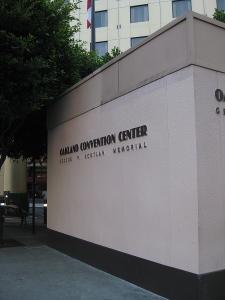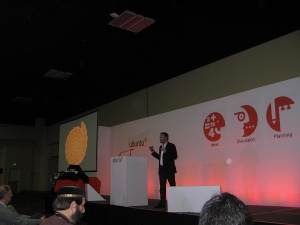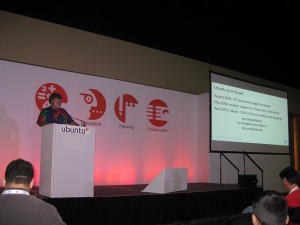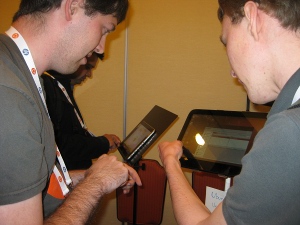Being local to the Ubuntu Developer Summit this time I had the pleasure of meeting up with several friends prior to the summit. Enjoying dinner in Oakland on Saturday evening, picking up a first time UDS attendee at the airport Saturday night after BART stopped running. Then on Sunday a lovely brunch at EPIC Roadhouse with a couple of friends who were staying in San Francisco Sunday and then heading over with them to Oakland with their luggage.
Having a UDS that’s local to me is actually quite a surreal experience. The excitement of visiting a new place and all the travel that goes along with it has been part of the whole experience every time I’ve attended a UDS until now. This morning between walking to the station, waiting for the BART train and then walking to the hotel I spent less than 30 minutes getting there!
It has also meant that I’ve traded the exhaustion of travel for that of being a helpful local. This morning I quickly ran out of my 15 “I’m a local” pins I bought for Ubuntu California attendees and was giving out blank Clipper transit cards throughout the day (I still have some if you’re reading this and need one). There was also plenty of helping folks with maps and quick questions (“where is chinatown?” and the like). I really love the bay area and have enjoyed sharing that with my fellow UDS attendees.
The day kicked off with an introduction by Canonical’s Community Team lead Jono Bacon and a keynote by Ubuntu founder Mark Shuttleworth. Quality and having a usable release throughout development were a major part of Mark’s keynote. As he mentions here the exciting part of the keynote was the unveiling of the first rack-ready 48-node 192-core ARM server from Calxeda. Some day I’ll get my sysadmin paws on such hardware!
From there, it was off to sessions.
– Community Roundtable –
We started off with introductions around the room and discussed some of our take-aways from Mark’s keynote. We also touched upon some documentation discussions that are scheduled or should happen during this UDS, including the proposed move to SUMO. Tomorrow we’ll be brainstorming a bit more for the Leadership Summit happening in the afternoon.
I’ve uploaded notes from the session here.
– OpenStack HA –
Having not kept completely up to date with OpenStack, but working with many of the technologies at work (HA clusters on Debian with pacemaker and corosync, drbd and application-level replication strategies), this was an interesting session for me. The discussion centered around what kinds of things should be handled by the OpenStack infrastructure and what should obviously be handled application-side, for several technologies in the stack, including MySQL, RabbitMQ, Nova, and with an eye out for what to do when Quantum comes out.
I’ve uploaded notes from the session here.
– LoCo Portal Content Review –
This session covered a lot of ground, but at the core it was a review of static text content itself on the LoCo Team Portal. Some action items were made for gathering photos for About Local Community (LoCo) Teams to make it more lively. I agreed to do some “wiki archaeological work” once a defined list of documents we want included directly on LTP is put together, as I’m quite sure all the text has been written at some point, it’s just hard to find on the wiki. There was also a fair amount of discussion about the severe lack of developers for the platform, which runs on Django, so a few folks will be reaching out to the community with some “getting involved” documents and blog posts to spark more interest – perhaps next UDS we can even add more features!
I’ve uploaded notes from the session here.
After lunch it was on to the plenaries.
First off was “How Ubuntu and Canonical work with OEMs” with Chris Kenyon. It was a very interesting talk that quickly dove into the adventure it’s been over the past 4 years to work with OEMs to learn the steps they need to take to get Ubuntu pre-installed at scale. A lot of the OEMs are exclusively geared toward Windows, so all their testing and automation is built around Windows. As a result, the Canonical OEM team has spent a considerable amount of time working with the professionals at the OEMs to develop these same tools to work on the rapid installation and testing required in this area.
The next talk was on “HP & Ubuntu” by Bdale Garbee. Garbee, always an excellent speaker, explained that HP is world’s largest IT company, and they have the opportunity to interact with hugely diverse market and get feedback. He discussed the Moonshot, Odyssey and Voyager programs and how they relate to Linux and Ubuntu. Then discussed Ubuntu on ProLiant story: 2006: support for Debian, 2009: broader support for “Community” distributions, 2012: Ubuntu 12.04 LTS to be Certified and Supported. He also mentioned that they are doing a significant amount of work with OpenStack (not only technical content, but also hosting the build farm). The latest Ubuntu LTS is the core for HP Cloud offering, public beta begins May 10th.
The last plenary was about the juju Charm Store by community member Marco Ceppi. He quickly explained what juju is “apt-get for the cloud” and what Charms are (deployment scripts, or the “packages” in the “apt-get” analogy). Charms are submitted to the Charm Store, charms are reviewed for security, best practices and completeness. It’s a living archive, not frozen like you’d find with Ubuntu itself. And he gave demo of a juju deployment he just deployed a few minutes before the presentation. There is a charm browser at jujucharms.com
– Test Drive Different Tablet UIs – User Experiences –
I ended up in this testing room after some sessions got shuffled around, and I’m glad I did! There were several Exopcs on display running various operating systems and environments, including Gnome3, Windows 8 and Unity on 12.04. ZaReason also brought one of their soon-to-be-released Zatabs running Android. It was a popular room, but the traffic was flowing enough that it wasn’t too hard to get to see everything.
– QA community structuring and needs –
Aside from testing I did when I was maintaining packages in Debian, I’ve never actually done a whole lot of software testing until just this past release when I started to help test ISOs for the Xubuntu team. The session centered around analysis and proposals of changes which may need to be made to the QA community to raise effectiveness, recruit more volunteers (and not burn them out!) and in general leverage the resources they have to get the best results.
I’ve uploaded notes from the session here.
Last session of the day! Ubuntu is seeking to get more developers to port (or simply write) applications to Ubuntu. I think the most interesting thing for me in this session was discussion related to some proposed “app contests” and how the discussion went from monetary and goods-based prizes to a more thorough analysis of what motivates people and is a compelling reward. It was generally agreed that something like recognition (ability to add to your resume “Winner of top app in Ubuntu for the month of July”) or prominent placement in the Software Center is going to be more valuable to a potential developer than a $100 gift certificate or goods (like a netbook) that may not be very useful to the developer who won it. There was also more general discussion about how we can better publicize app development for Ubuntu in general so potential app developers know it exists and have a clear path laid out to begin submitting apps.
I’ve uploaded notes from the session here.
After sessions I had several great hallway conversations before heading to the night’s meet and greet welcome event. I only stayed for about an hour, as I needed to head home to do some more preparation for the days ahead.





